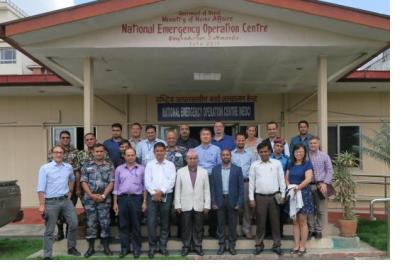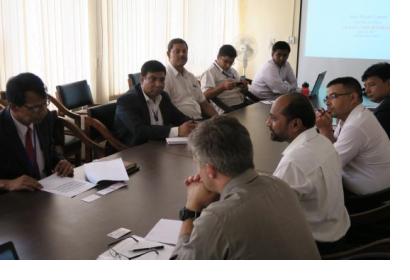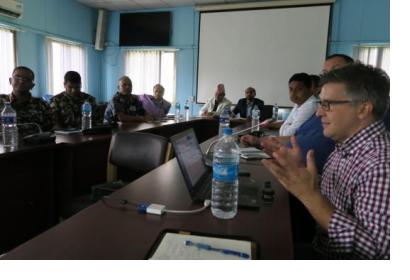From 31 July to 4 August 2017, UN-SPIDER carried out a Technical Advisory Mission (TAM) to Nepal to evaluate the current and potential use of space-derived information in all aspects of disaster management and offering recommendations to strengthen the disaster risk management and emergency response in the country. The mission was conducted upon request from the Ministry of Home Affairs (MoHA) and with the technical support of the International Center for Integrated Mountain Development (ICIMOD). ICIMOD is one of the 21 regional support offices of the UN-SPIDER programme.
The mission team was comprised of nine experts from United Nations Office for Outer Space Affairs (UNOOSA)/UN-SPIDER, ICIMOD, Chinese Academy of Sciences, United Nations Office for the Coordination of Humanitarian Affairs (UNOCHA), Center for Interdisciplinary Geospatial Technology of Delta State University, United Nations Affiliated Centre for Space Science and Technology Education for Asia and the Pacific hosted by Indian Space Research Organisation and DigitalGlobe, Singapore.
The team visited key stakeholder agencies contributing to disaster management to take account of current policy and gaps, availability of geospatial information, current use of space-derived information, data sharing practices, applications of geospatial information, challenges and constraints, existing capacity and needs, institutional linkages and coordination and applications to strengthen disaster risk reduction and emergency response.
The team conducted bilateral discussions with following organisations: National Emergency Operation Center, Armed Police Force, Department of Survey, Department of Water Induced Disaster Management, Nepalese Army, Nepal Police, Department of Hydrology and Meteorology, Department of Mines and Geology, Kathmandu Living Labs, Nepal Red Cross Society, Nepal GIS Society, International Center for Integrated Mountain Development (ICIMOD) and United Nations Resident Coordinator’s Office (UN-RCO) and other UN agencies involved in disaster risk reduction.
On the fourth day of the mission, the national workshop on “Use of Space Technology in Disaster Risk Management” was organized, which was attended by more than 65 participants. On the fifth day, the mission team compiled and presented their observations and recommendations to high level officials of the MoHA, UN-RCO and other key stakeholders. UN-SPIDER will continue to work with Nepal to implement recommendations of the technical advisory mission.
Contact: Shirish Ravan (shirish.ravan (at) unoosa.org)



